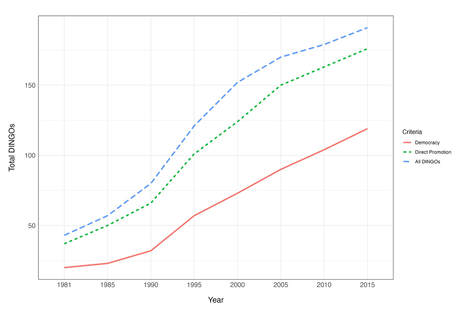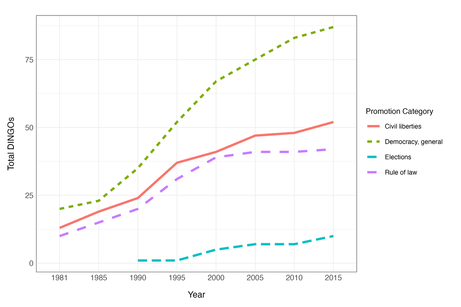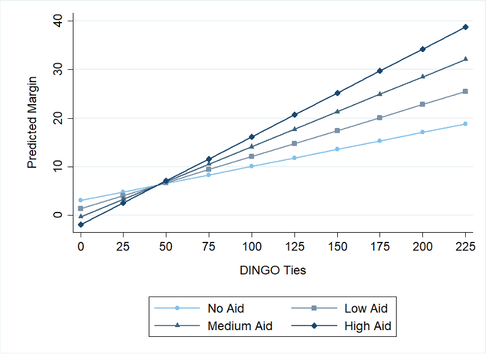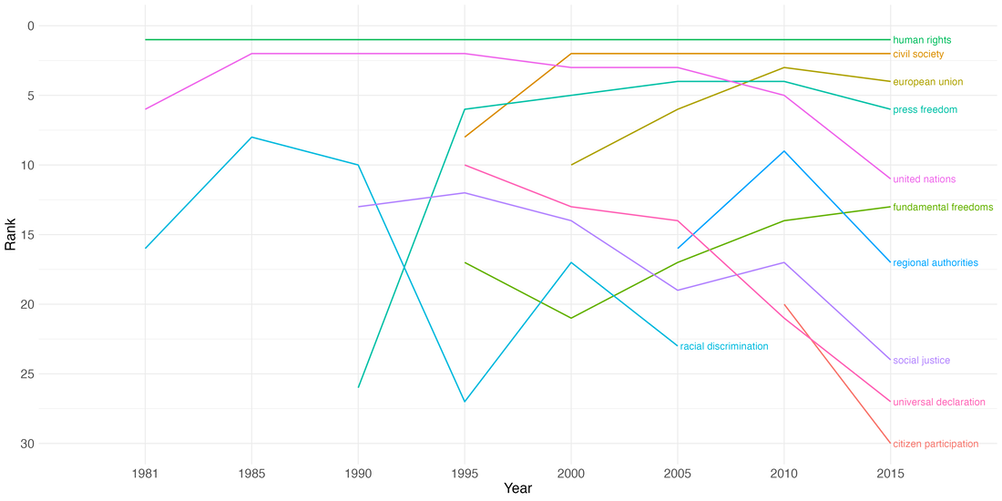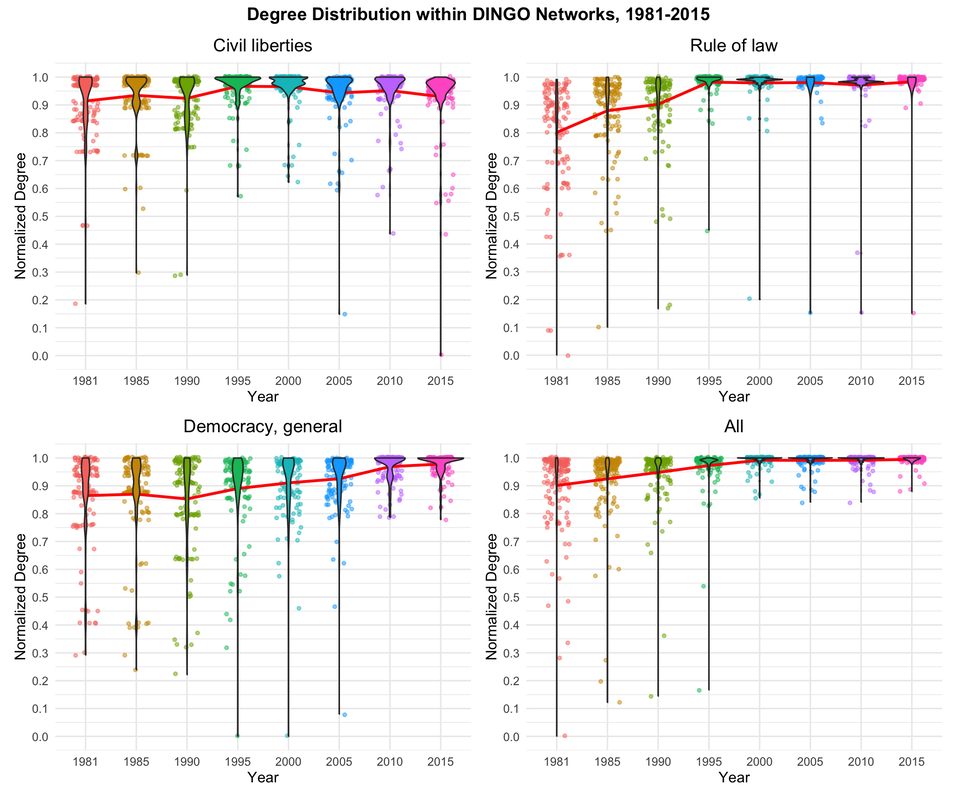research:
current projects
DINGOs and democracy promotion
As the Cold War neared its end and democracy became the prevailing model of legitimate government worldwide, global democracy promotion efforts skyrocketed. Yet an uptick in hybrid regimes (i.e, governments using democratic policies to mask authoritarian practices) suggests that democracy is in crisis. This project therefore asks: why, despite a period of unparalleled democracy promotion, is democracy in decline? Although prior work examines how global norms are disseminated, the process through which democratic norms are interpreted, transformed, and contested during diffusion is not well understood. This project therefore explores how one crucial yet currently understudied set of actors, democracy-promoting international nongovernmental organizations (DINGOs) 1) mold democratic norms along various points in the diffusion chain and 2) how these DINGOs help or hinder democracy.
|
I. The DINGO Dataset: The Growth, Objectives, and Linkages of Democracy-Promoting International Nongovernmental Organizations
The democracy promotion enterprise has exponentially expanded since its inception in the late 1980s. Since this time, countless studies have illuminated our understanding of the democracy establishment--from strategies and goals, to successes and failures. However, this literature is incomplete in one critical way: because most scholars focus on governmental actors, the presence, attributes, and strategies of global civil society actors working in this space, including democracy-promoting international non-governmental organizations, or DINGOs, has not, until this point, been systematically documented or studied. Made possible through a generous Doctoral Dissertation Research Improvement Grant (DDRIG) from the NSF, the DINGO dataset fills this gap, tracking the emergence and trajectory of active democracy-promoting international nongovernmental organizations (DINGOs) from 1981 to 2015. Collected from physical volumes of the Yearbook of International Organizations (YIO) published by the Union of International Associations (UIA) in five-year increments, the DINGO dataset provides historical snapshots of the DINGO field over a key period of international democracy promotion. Country memberships, organizational attributes, and reported aims and activities are collected for each DINGO, which are classified in several different ways based different inclusion criteria and categorical designations. Descriptive analyses suggest that DINGOs have exponentially increased over the period of analysis--from less than 50 to nearly 200 organizations around the world between 1981 and 2015. Variability emerges when trends are disaggregated by category (elections, civil liberties, rule of law, general democracy) of democracy promotion--coded based on organizational aims. The DINGO dataset will soon be publicly available! |
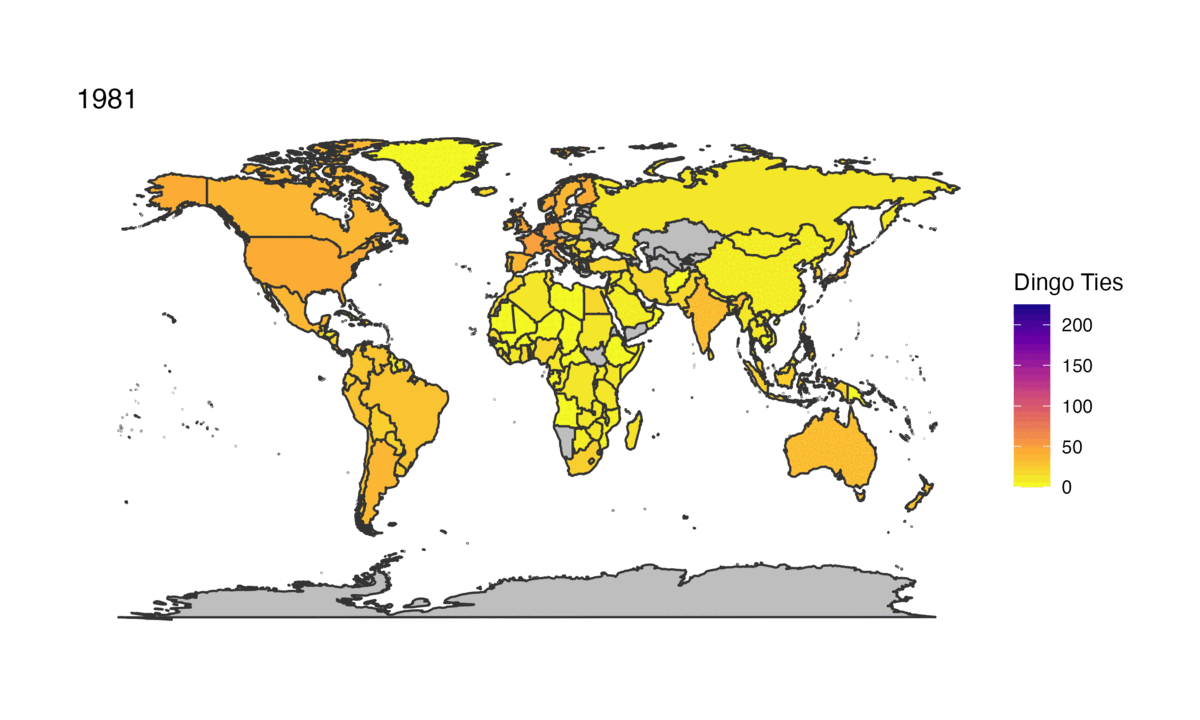
DINGO Ties by Country, 1981-2015
II. Put Your Money Where Your Mouth is? Normative and Monetary Democracy Assistance and Democratization
|
|
Drawing upon the DINGO dataset, this paper offers some initial insight into how a nation's number of DINGO linkages impacts its level of democracy in policy versus in practice, thus examining the extent to which DINGOs contribute to hybrid regimes. Results from a series of longitudinal regression analyses show that as DINGO ties increase, so too do voter suppression, despite universal suffrage mandates. When democracy aid is high, this relationship becomes even more pronounced. Thus, despite DINGOs' best intentions to foster democracy, their presence is linked to poorer suffrage outcomes, particularly when aid is bountiful. On the other hand, when democracy aid is high, there is a positive link between respect for civil liberties and DINGO ties. Together, these findings show that democracy assistance via DINGOs can both help and hinder democracy, depending on the area of focus. Whereas DINGOs are linked to violations of suffrage rights, they are also linked to improve respect for civil liberties. In addition to illustrating how promotion can sometimes lead to contradictory effects, results also show how the very organizations that construct, deliver, and frame democratic norms may themselves be contributing to noncompliance and the rise of hybrid regimes.
|
III. The Origins of Decoupling: Evaluating Democracy-Promoting INGO Objectives
Diving deeper into the rich information provided by the DINGO dataset, this paper explores trends in the objectives set forth by DINGOs to provide further insight into why DINGOs fail to prevent hybrid regimes. As existing research suggests, democracy promotion often fails to achieve its intended goal of democratization, often unintentionally undermining democratic government in favor of authoritarian alternatives. This paper explores the veracity of this claim in relation to DINGOs. Computational text analysis and more specifically word embeddings detect thematic patterns in democracy promotion and analyze their change over time. Results show that DINGOs are, like other forms of assistance, becoming "tamer" (i.e, they fail to confront dictators). In early periods of democracy promotion, DINGOs were mostly focused on opposing non-democracy. However, as the organizational field became more standardized, DINGOs began to place a greater emphasis on professionalization and reforms. By 2015, DINGOs solidified their focus on cultural values, achievement-oriented, tame democracy assistance. Trends in bigram frequency additionally illustrate the ebb and flow of different democracy promotion priorities over time. Together, these results show how DINGOs actively direct democratization as they interpret and reshape democratic ideals.
Diving deeper into the rich information provided by the DINGO dataset, this paper explores trends in the objectives set forth by DINGOs to provide further insight into why DINGOs fail to prevent hybrid regimes. As existing research suggests, democracy promotion often fails to achieve its intended goal of democratization, often unintentionally undermining democratic government in favor of authoritarian alternatives. This paper explores the veracity of this claim in relation to DINGOs. Computational text analysis and more specifically word embeddings detect thematic patterns in democracy promotion and analyze their change over time. Results show that DINGOs are, like other forms of assistance, becoming "tamer" (i.e, they fail to confront dictators). In early periods of democracy promotion, DINGOs were mostly focused on opposing non-democracy. However, as the organizational field became more standardized, DINGOs began to place a greater emphasis on professionalization and reforms. By 2015, DINGOs solidified their focus on cultural values, achievement-oriented, tame democracy assistance. Trends in bigram frequency additionally illustrate the ebb and flow of different democracy promotion priorities over time. Together, these results show how DINGOs actively direct democratization as they interpret and reshape democratic ideals.
IV. Patterns of Global Democracy Promotion: Eigencentrality in DINGO Networks, 1981-2015
Building upon the foundation established by the above projects, this paper provides a launching point from which to examine the organizational networks formed by DINGOs. This will enable the continued exploration of two separate but related diffusion processes: 1) the spread and standardization of democracy promotion strategies through DINGO networks, and 2) the dissemination of these highly standardized democratic norms to nations embedded within these DINGO networks. To begin, this paper provides the first ever descriptive analysis of nations' centrality within various DINGO networks over time. It offers novel insights about DINGOS, their relations with states, and their structural capacity to foster democratization, all while providing a more complete picture of the democracy promotion enterprise. Results suggest that an increasing number of nations are becoming increasingly integrated within DINGO networks across all network categories (civil liberties, rule of law, and general democracy), and motivate further exploration of democratization through these channels.
Building upon the foundation established by the above projects, this paper provides a launching point from which to examine the organizational networks formed by DINGOs. This will enable the continued exploration of two separate but related diffusion processes: 1) the spread and standardization of democracy promotion strategies through DINGO networks, and 2) the dissemination of these highly standardized democratic norms to nations embedded within these DINGO networks. To begin, this paper provides the first ever descriptive analysis of nations' centrality within various DINGO networks over time. It offers novel insights about DINGOS, their relations with states, and their structural capacity to foster democratization, all while providing a more complete picture of the democracy promotion enterprise. Results suggest that an increasing number of nations are becoming increasingly integrated within DINGO networks across all network categories (civil liberties, rule of law, and general democracy), and motivate further exploration of democratization through these channels.
